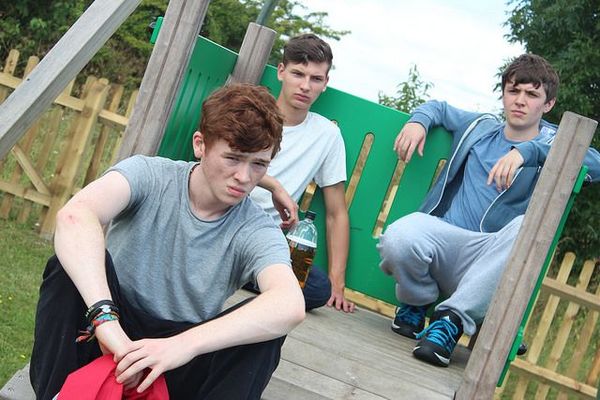Eye For Film >> Movies >> The Lesson (2015) Film Review

A leafy suburb, rolling hills, quiet roads, the sort of place many young parents think will be ideal for raising kids - and, indeed, such places often are, until those kids reach their teens, at which point they want desperately to get away. There's simply nothing to do in these green and pleasant nowheres. That boredom seeps into every aspect of life. The kids can't concentrate at school. They see no prospects in life. They drink and smash things up and endlessly vie for dominance. Schoolwork is not a priority.
Such is the world of Ruth Platt's feature debut, and it's nicely delineated in early scenes which promise a lot more than what ultimately materialises. The juxtaposition of the boys' frustrated sparring and the potential hidden in both the environment and classroom speaks to the way the adult world has failed them - in fact, young Fin (Evan Bendall) has no real adults in his life at all, just an older brother still unable to let go of sibling rivalry. The desire he feels for his brother's partner, Mia (Michaela Prchalová) doesn't make things any easier. But all of this is invisible to teacher Mr Gale (Robert Hands) who just sees him and his friends as thugs making trouble for the sake of it.

Thus we get to the crux of the film, which involves Mr Gale kidnapping Fin and his friend and trying to force them to learn through torture. Some teachers in the audience will no doubt sympathise with this and there's a lot of blackly comic potential to it, but Hands simply isn't a strong enough actor to pull that off. His character plays like a schoolchild's fantasy of an evil teacher and has no depth beyond the robotic performance of classroom functions. Nothing about him is believable. Poor Bendall works hard and does a better job of communicating pain than many more seasoned actors, but that aside, he has neither the skill nor the charisma to carry the film on his own.
The irony built into the film is that by watching Fin's suffering the audience will themselves be exposed to a refresher course in basic principles of literature and history (Mr Gale doesn't bother with maths or science, perhaps due to having a limited education himself). As horror film audiences tend to be pretty well educated, however, it's unlikely they'll gain much from this, and it's never clear whether or not we're supposed to be laughing at Mr Gale's trite interpretations. Those who enjoy gore may be pleased by Platt's unflinching look at the damage done, but that's not not particularly rare anymore.
Compounding these failings is the film's problematic ending, in which an attempt to shift gears undermines much of Bendall's work to make Fin's suffering believable, and which sees Prchalová's initially promising character reduced to an object for exposing misogyny and providing sexual reward. All in all, this is a disappointing effort which uses the crudest of tools to try and manipulate audience emotions. One hopes that lessons will have been learned.
Reviewed on: 19 Feb 2016
















